|
Getting stopped by ‘The Fuzz’ has become part of our daily routine as we travel east. Our running total has now reached more than 40 times in the last 12 months alone. In most Eastern European countries the police have a bad reputation for stopping tourists and collecting bribes. This can be incredibly frustrating when so much bad driving is going on around you unpunished. Emma and I have a strict rule that we will never pay a bribe, and up until now we have stuck to this and not parted with a penny! This kind of low-level corruption should never be encouraged; paying backhanders only makes the police expect subsequent payments from your fellow overlanders. Obviously this is for ‘made-up’ charges and false accusations, if you actually do the crime you should pay the legal fine. Surprisingly Russia wasn’t the worst offender, as we’d heard, we were pulled over at least 10 times but never actually asked for any money. On the one occasion they actually stopped us legitimately, I was made to sit in the back of the smokey police Lada, and much to my surprise the officer showed me a photograph on a laptop of our car travelling at 72kph in an apparent 50kph zone 5km back down the road. Once he learnt we were heading to Mongolia he called us crazy and sent us on our way. Checkpoints are a fairly regular occurrence in foreign countries; we had them in Morocco, Russia, Ukraine and all the ‘Stans. Most of the time they have police control buildings at the side of the road, normally located just after a succession of decreasing speed limit signs crammed into a 50m stretch, making it virtually impossible to slow down in time. In the Ukraine we got stopped by a rather over-zealous speed gun operator stood next to the speed limit sign (90km down to 30km). He wanted to see all my original documents and took me into his little room where he placed his gun on the table and basically tried to get me to pay $200. After playing the dumb tourist (which Emma thinks I’ve mastered), a long wait and a refusal to get into his police car to take us to the nearest ATM, we left without paying a thing! The secret to avoid getting stopped at checkpoints is to avoid making eye contact, helped enormously by a right-hand drive vehicle! That tactic worked up until Kazakhstan where the police stopped us a whopping 17 times. On one occasion I apparently broke 4 laws in the space of about 30 metres when I pulled out from a petrol station. Most of the time the police, waving large orange sticks and whistle blowing excessively, are generally just curious about Bee-bee and her number plate. Again, this discrimination is incredibly frustrating when complete lunacy is going on all around you in cars that are totally unfit for the road. In the former Soviet countries the police are generally pretty useless at patrolling bad driving, ironically the ‘sleeping policemen’ are more effective at controlling the traffic. The permanent farcical wooden police car cut-outs are also a poor deterrent to discourage bad driving. The police do however like inspecting paperwork. Being tourists you do have the advantage that most of the officers have no idea what they are looking at when you hand over documents. Give them colour photocopies in the first instance unless they strongly insist otherwise- once they have the originals the bribing ball’s in their court! Much to our amusement most of the police we encountered looked like the comical sculpture we spotted in Finland 4 years earlier, only the police in the ‘Stans having disproportionately larger hats. We soon learnt that if we stopped far enough down the road past the typically portly police in their elasticated-waist uniforms, their laziness would prompt them to wave us on rather than walk to our car. On the few occasions they did make it to the window (normally the passenger side) we used our over-the-top, non-stop friendly English accents and diversion tactics like showing them the shower and solar panel to charm them/confuse them into letting us go. If you are calm, polite, patient and show them you have all the time in the world to wait they normally get bored of you and can’t be bothered with the hassle of continuing to extort money from you. Even if you can speak the local language, stick to your own because they don’t have the patience for this either.
0 Comments
Following on in our ‘Adventure Annoyances’ series we look now from the surface of the roads to those driving on them, specifically the Bad drivers. Every country has atrocious drivers; only some have more than others, the worst offenders we have found being in Albania, Turkey, Russia and Georgia. Tailgating is a huge problem in all countries, with cars literally less than 2m from your rear bumper at speeds of more than 50kph. The Georgians & Russians in particular have a unique style of overtaking, which involves passing as close as possible to your vehicle; behind, along side and in front. We have witnessed vehicles overtaking vehicles that were already overtaking other vehicles. We frequently see people being forced off the road by on-coming overtaking vehicles, usual accompanied with a kind, informative light flash which states “I’m coming through, even though you have right-of-way and I’m going to have to force you to brake and swerve”. The hard shoulder, when it exists, is also a valid lane for ‘undertaking’. We rode in several Taxis in Georgia’s capital Tbilisi and not once did I see the drivers use their mirrors. One driver purposefully inched sideways todays a lady driver to intimidate her and another reached out his window and snapped off the wing mirror of another car who refused to move out his way. Outside of Europe no one uses baby seats in cars, it’s not unusual to see children playing on dashboards, sat on laps (without seatbelts) and standing in the gap between the two front seats. In Bishkek (a city renowned for it’s chaotic, fast traffic) we witnessed a 5-year-old boy steering the car from his fathers lap whilst dad sat back and ate a sandwich. On one occasion in Armenia crossing an icy, snowy pass we encountered a white Lada on its roof being retrieved from down a steep verge. 30 minutes later the same white Lada overtook us on a blind bend! Seemingly it doesn’t matter what the driving conditions are, the drivers don’t seem to change their driving habits. We had several near misses in fog because other drivers failed to use their lights; rain, snow and ice also have no effect on drivers speed or care. Bright sunshine in your eyes? Just cover your driver’s window completely with a towel, shading your eyes and also obscuring your entire peripheral view. Why just drive when you can multitask? - Combine it with messaging on your phone, reading the paper or eating your dinner? The condition of the cars also doesn’t fill you with confidence, bald tyres, broken windscreens, no lights and often completely overloaded (and that’s not just our car!), sometimes to the point where you are swerving to avoid tumbling items from the truck ahead; from rocks and gravel to onions and potatoes.
One positive side to all of the bad drivers (excluding taxis!) in the countries mentioned is that these motoring misdemeanours are rarely carried out in an aggressive fashion. People seem to accept each other’s stupidity, dangerous manoeuvres and blatant disregard for human life as all part of normal, daily road use. Horns are beeped cheerfully to let others know you’re about to do something reckless and stupid, rather than as a hostile reaction to others foolish and careless driving. Narrowly missing a head-on collision at 60kph on a blind bend from an oncoming, overtaking pickup with windscreen obscured by the tons of hay precariously piled on top… a wave and a big happy smile from the driver on the phone with his baby on his lap and it’s all OK. Gaze at the constant stream of romantic overland expedition posts on social media and it’s easy to believe that it’s all exotic sunsets, idyllic camp spots and laughter with locals. In reality however, it’s not all thrilling and fulfilling- overlanding has more than its fair share of exasperations and frustrations. But surely that’s part of the experience, right? Most days these provocations can be shrugged off, even laughed at, but even with the strongly developed tolerance and patience of an overlander sometimes these few repeating niggles make you want to scream from the roof(tent)tops. In this short series of blogs I retain the right to rant, expose the things that have left nail marks in the steering wheel and detail our main adventure annoyances, our overlanding irritations. So here is my stage on which to vent. First up, bad roads. Expected? Yes. Tolerated? Mostly… We’ve experienced some pretty terrible roads on our travels. Just to clarify, we’re not talking about off-road dirt tracks high up into the mountains here, we’re talking about main roads, motorways and city streets. Russia, Kosovo, Albania, Armenia, Kazakhstan and Tajikistan all have their fair share of ‘bad’ roads often with potholes larger than your car. Deep chasms are not the only surface danger, due to heavy truck traffic many roads become furrowed, once in a groove your vehicle handles like it is on rails, without a vigilant steering wheel wrestle this can suddenly send you veering towards oncoming traffic. Travelling in Armenia in your own vehicle is costly, on entry we paid at least £50 for ecology and road tax. Ironically when we left we should have billed Armenia for the damage done to our car for using such terrible roads. I’m not sure where the tax money is going but it certainly isn’t being spent on the roads. The highway system in Armenia consists of 7,633km of (apparently) paved roads, of which, 1,561km are supposedly expressways; our average speed on Armenia’s M1 was about 28mph. One of the worst stretches of urban street we encountered was in Sevan; some of the potholes on the main high street are so large you can see them on Google Earth! It is not just the road surfaces that are dangerous in these countries; the lack of road markings, signals and ambiguous road junctions are equally hazardous, as are open drain covers and deep gutters. Other potential dangers include animals, overloaded trucks and clueless pedestrians. In Georgia we narrowly avoided hitting a child, who crossing the road with his mother, ran straight out in front of our vehicle. Fortunately the only physical damage done to him was from the heavy clout round the ear his mother gave him for being so careless. Georgia’s excessive use of speed bumps is simply annoying. A motorway should never have speed bumps! Especially unmarked speed bumps.
In Western Europe we have a system for using roundabouts, it works because every roundabout employs the same system, you know your place and everybody else knows theirs. In Eastern Europe the system fails as every roundabout operates a different system. Some roundabouts allow vehicles that are approaching to have right-of-way whilst others allow the vehicles on the roundabout to have priority, some even employ both on the same roundabout. Some roundabouts even have traffic lights mid-roundabout whilst others have no road markings at all and are simply a massive city square with six lanes of traffic and a fountain in the middle. So, bad roads, the first of my adventure annoyances- the logistical network allowing me to traverse this wonderful planet, but at times my reason for breaking the 6pm G&T rule. As British passport holders we are incredibly privileged to have access to 174 countries and territories around the world either visa-free or with visas on arrival. These stats rate the British passport #1 in the world (tied with Finland, Germany, Sweden and the United States). In comparison, the Russian passport is rated #38 in the world with access to 100 countries and territories. Throughout Europe there are only a handful of countries that allow Russians in visa free, as a result Montenegro is an incredibly attractive country to visit for Russians. Unfortunately the divide between the rich and the poor in Russia is vast. This is reflected by a survey conducted in 2012 by the Levada Centre. Only 17% of Russians possess an international passport; 78% of those surveyed had never been outside of the country and only 3% had travelled outside of Russia more than once a year. Travel (or leaving the country forever) is exclusively for the rich in Russia. It’s not unusual for privileged Russians to ‘up sticks’, according to the UK’s most reliable source for unbiased information*, The Daily Mail, Russian millionaires now buy one in five of London’s most expensive properties. For Russians who prefer a slightly warmer climate than London, Montenegro is an obvious choice, they’re both Orthodox and, as Slavs, their languages are related. Montenegro is an exceptionally beautiful country, sadly many of its visitors don’t see beyond its 72km of beaches. The verdant interior is lush and dramatic and offers some outstandingly stunning driving. The coastline around Budva, is the heart of tourism, and is lovingly referred to as the Budva Riviera and occasionally Moscow-on-Sea by our British counterparts. According to some newfound friends in Budva, Russians now own nearly 50% of properties in Montenegro. Unfortunately this substantial Russian investment in Budva means that it is developing rather hastily in a fairly unplanned fashion. High rise apartments, casinos, open-air nightclubs and gaudy hotel complexes fight for attention along the ever-expanding coastline. The beautifully quaint old town, a treasure chest of cultural heritage and well worth a visit, is now sandwiched between the rather obnoxious Avala Resort & Casino and the Duckley Marina, which can now thankfully accommodate yachts up to 70m. Perfect for those Russian Oligarchs who don’t want to be out-done by the multi-billionaires with their +100m yachts. Unfortunately just 400m away from the old town is the Russian playground; gaudy is the prevalent style along Budva’s ‘Bar-Street’. Open-air nightclub sound-systems battle for your attention trying to lure you in to their uniquely themed bars. Who could resist a bar that looks like a pirate ship or if you were feeling continental maybe a Paris (complete with 10m Eiffel Tower) themed bar would be more appropriate. The old phrase “money can’t buy you good taste” is apt, and that is Budva’s problem, it is confused. It is a holiday resort that wants to punch above its weight with 5-Star luxury but unfortunately enters the ring to the theme tune of Serbian ‘Turbofolk’ (possibly the worst genre of music ever!) wearing a bright pink real mink fur coat and 6-inch heals necking shots of Vodka. This Russian investment is obviously creating jobs and revenue for Montenegro (although most of the people we met working in hospitality were from Serbia) and the tourist industry is clearly thriving. Using Budva as a base we spent 10 days exploring the surrounding coastline and documenting the beaches outside of the typical tourist season. The resulting photographs tell a story all of their own and to some degree answer the question – Is Russian investment going to have a long-term detrimental effect on Budva? *Sarcasm It was the first time I had ever planned a route taking into account the curvature of the earth; an epic drive home as directly and quickly as possible to reunite with family. Fortunately our Russian visas allowed us a window of 21 days in which to back-track across this colossal country. It had taken us 43 days to cross on our journey east. Heading west we had given ourselves 9. Tranquil campsites were replaced with grimy truck-stop parking lots and ropey motels, sedate home-cooked meals swapped for dreary cafes and lorry driver’s canteens. Eyes on the perpetual horizon and always ready to embrace new travel experiences, we embarked on our gargantuan drive enjoying an intriguing insight into the wearisome world of Russian truckers. For as little as £1 you can get a prime space in a ramshackle truck stop car park; a man with several scabby dogs acts as ‘security’ (we spent more feeding the ravenous canine crews). Toilet use involves minimal contact with as fewer surfaces as possible and frequently there is the optional extra of a makeshift wooden sauna (which we politely declined each time). For an accommodation upgrade (and potentially a shower) a motel is braved. Entertainment choices may include a crackly TV showing a few channels with a disproportionate number of violent police action dramas. No TV and you are resorted to playing ‘count the stain’, ‘crack a smile out of the owner’ or ‘avoid being electrocuted by the water tank plugged into a socket in the wet bathroom’. The adjoining cafe may boast several items on a menu but eventually you reside yourself to the fact that if it’s not Borsch (Beetroot soup), Pelmeni (Siberian pasta dumplings) or Cutlet (unidentified fried meat shape) then the response will be a stern “NIET” from the waitress. After a long days drive, nothing says ‘appetizing’ like a bowl of doughy meat parcels bobbing about in tepid, greasy grey water with a blob of mayonnaise floating on the surface. Borsch looked more appealing (at least it had colour) with the added lottery-like anticipation that there might even be a piece of meat swimming at the bottom. Baltika beer was our saviour; what the Russians lack in culinary skills they make up for in brewing. It was a poignant moment as we crossed from Russia into Ukraine and a gradual return to the familiar and straightforward; relieved that we had made it but sad to leave what has been an incredible and unforgettable country.
Emma Up until now, only facebook users have been fortunate (?) enough to view our ongoing Video Diaries or “Vlogs” (as modern technology terminology now calls them). Some of our experiences are simply not justified through still photos and writing. Take for example Andy’s depth-checking wade across a Mongolian river in his pants, off-road mud sliding or bone-shaking driving across corrugated Siberian roads.
From the rooftop of St Sofia’s Cathedral and the depths of ice caves to the glaciers of Norway and shore of Lake Baikal, hopefully these will reveal personal snapshots of our journey and allow another dimension into our adventure records. You can view all our ‘Vlogs’ on our very own 800days YouTube channel here; http://www.youtube.com/user/aroundtheworldin800/videos Emma It’s hard to tell if Russia has benefitted from the fall of communism in anyway, as outsiders we have no benchmark to compare it to. Our first impressions were of a country that was slowly falling apart; the roads are appalling, buildings are subsiding and according to Time magazine, Russia is ranked fairly high in the world’s most corrupt economically developed countries. One thing that is apparent having spent time there is that Russia is a country of extreme contrast. The freezing winter temperature often hits -40°C, whilst we have experienced sweltering summer temperatures of +37°C with, surprisingly, not a furry hat in sight! Many major city centres have started rebuilding roads and restoring great buildings, but the outskirts are still drab depressing suburban tower blocks that are slowly falling apart at the seams. Westernization (good or bad) is slowly setting in, Macdonald’s is a regular feature and some cities even welcome tourists in a somewhat ‘novice’ kind of way. Outside of the big cities it is not unusual to see woman tending fields in a style evocative of the 17th Century whilst Mercedes race past on perfect motorways that can turn into dirt tracks without warning. The countryside is vast and can be a little overwhelming; on our first day we drove for 8 hours straight, through hundreds of miles of forest that enclosed the road. In that time we didn’t pass one house. The landscape didn’t change much for the first week. On attempting to camp we were continually greeted at every track into the forest by huge piles of rubbish; this was typical of the entire country were seemingly it is ok to ruin the natural beauty of a place by playing excessively loud euro-trance from your car and dumping rubbish. The country as a whole is very beautiful but it wasn’t until we travelled further east that the forest dissipated and a slightly more interesting landscape opened out before us. The Lake Baikal area was a real highlight. The Ural Mountains (hills) were a real disappointment. As visitors driving through the country we encountered a large cross section of the population. Generally speaking, Russian’s are very serious people with a rude temperament; occasionally they will let you past their tough exterior and be friendly, warm-hearted and sometimes even smile. Normally this unusual phenomenon is fuelled by excessive alcohol consumption, which seemingly is a large problem in Russia. Alcoholism coupled with the language barrier made it hard for us to understand situations; often we were left feeling a little uneasy, as it seems the Russian’s have a fiery temper and it was hard for us to know if we’d upset them.
Sadly, it is said that in Russia a person who smiles too often is generally classed as insane. The deadpan facial expression is common and can leave you a little bemused. Mostly, Russia is filled with the unwelcoming stern-faced Russian who answers ‘nyet’ in a deadpan monotone to every question. This type of Russian normally sees everything in black and white, with no room for negotiation, especially with a foreign tourist. Occasionally we were met by the opposite end of the spectrum; a new, younger Russian, who seemingly understands the importance of allowing foreigners into Russia, and is very proud of their country and will go above and beyond to help. Our experience of Russia was initially one of ‘oh god what have we let ourselves in for’, once we got to grips with the language (a little) and the culture the old phrase ‘judging a book by it’s cover’ became very apt. Despite cultural differences (mostly alcohol related) we really enjoyed our time in Russia and met some truly great people. We can’t wait to return when we pop back through from Mongolia to get into Kazakhstan. Andy Our first glimpse of the world’s oldest and deepest lake came after we had left the city of Irkutsk 70km behind us; bumping over the brow of a hill this ‘Pearl of Siberia’ twinkled in the valley below stretching endlessly towards the horizon. If you look at a world map and trail your eyes East across Russia, the scale of this enormous water body is evident. Geographically, it is extremely impressive; a maximum length of 395 miles, maximum depth of 1,642 metres and over 25 million years old. In the winter it freezes over and you can drive a car across. Its Ecology is equally extraordinary; of the 1,085 species of plants and 1,550 species of animals, more than 80% are endemic- found here and nowhere else in the world. However, even in the knowledge of these facts and statistics, it is still the sight of Lake Baikal that is the most striking and notable. The expanse of pine forested shorelines, pebbled beaches and water, which stretches as far as the eye can see, is simply stunning. After 6 weeks in Russia without seeing another fellow ‘camper’ we were met on the Southern shore of Baikal by what resembled a Russian lakeside Glastonbury. During the summer months, this area of the lakes perimeter is a playground for urban-weary Russians who descend en-masse and construct huge temporary canvas settlements along its shoreline. Tired after travelling, we were lucky to find a small spot to camp, only to be woken a couple of hours later by new neighbours 2metres to the right who started their fire and tunes around midnight. This in addition to the railway line only several hundred metres behind us, with cargo trains of over 60 containers taking over a minute to thunder past what felt like inches from our heads. We left the Southern shoreline hurriedly in search of calmer waters and didn’t need to travel far; within hours we found a stretch of shoreline with only a few families dotted amongst the woodland. We spent several days in this idyllic spot; the water is crystal clear and perfect for swimming (if a tad refreshing!). The weather in this region is much more changeable and a foggy morning would be followed by blazing sunshine, then a torrential downpour with thunder, only for the clouds to clear and the sun to burn through again. From our hammock swung between the trees, you can watch chipmunks jumping from the branches and waterfowl bobbing past on the lake surface. A local fisherman dropped by each morning on his motorbike with fresh Omul caught from the lake. A relative of Salmon, this native fish species tastes amazing smoked, with delicious soft, white flesh that just falls off the bone. We befriended the Russian family camped in the next clearing and despite language barriers, shared our evening meal and a few beers, using a ‘point it’ book to communicate and showing photographs of home.
Venturing even further north along the east coast, the area becomes quite uninhabited; here we had an entire stretch of sand and pebble beach to ourselves, the roar of the railway had long gone as the tracks snaked away south towards Mongolia and China. Watching the sunset, the whole landscape turns a warm orange and the only sounds are the cries of gulls and the gentle waves lapping at the shore. This was a perfect end to our time in Russia, possibly the most beautiful place we had visited and a time to relax, reflect and prepare for the next stage in our journey. Emma Hours of journeying on fast, busy, noisy motorways, slowing down only temporarily to circumnavigate the choked outskirts of sprawling cities, had started to take it’s toll on us and we yearned again for a quieter journey and to experience rural areas away from the clamour and chaos of the highway. We decided to take a detour that would allow us to witness the magnificent Kremlin of Tobolsk, then follow the Irtysh River as it flowed southeast, bypassing the huge cities of Omsk and Novosibirsk and re-joining our route towards Tomsk in the East. The road bends, winds and dips following the watercourse as it meanders serenely southeast through Siberia. Our grumbles about the state of the main ‘red’ highways paled into insignificance as we quickly downgraded on the map from yellow roads ‘with covering’, white ‘without covering’ to grey ‘un-surfaced’. The roads are in terrible condition; potholes, ridges, gravel, mud, sand and dust. If you are unfortunate enough to get stuck behind a slow-moving truck, the clouds of dust it kicks up reduce visibility to almost zero, rendering it almost impossible to overtake and necessitating the windows to be kept tightly shut, increasing the in-car temperature rapidly. Progress was ‘leisurely’ but allowed us to observe our surroundings off the beaten track. At several points on our 1cm=30km map, where the road ‘crossed’ a river we were met, not by a bridge, but by an array of ageing ‘boats’; some that can only be described as rusting, floating wooden platforms nudged, shoved and arduously towed by a small, underpowered motorboat throttling under the strain and belching fumes as it struggles across the water channel. With no sense of urgency, these ‘ferries’ wait until they have enough vehicles to warrant the 150m crossing, and so it was we spent an hour with no shade in the sweltering Siberian heat until ourselves, a milk truck, a pick-up and the obligatory Lada were loaded via a precarious ramp from the beach and positioned to balance our vessel for the 8 minute voyage.
Agriculture is on a simpler, smaller-scale; gone are the characterless, machine-rolled hay bales of the highway fields and in their place traditional haystacks, laboriously piled high by hand by gangs of farm workers with pitchforks. Farmers dawdle along the roadside on ancient-looking horse and carts and families bump along the gritty tracks on motorbikes with children balanced not in a sidecar, but some kind of homemade platform. Pockets of woodland are dotted amongst meadows with huge swathes of pink wildflowers, the clover so fragrant you can smell it as you drive past. On one occasion, our camp was visited by a group of young red foxes, a male sniffing and investigating the car as we watched from our roof tent vantage point. Upon entering a village, the road forks in several directions. The small wooden houses, almost all of which suffer from subsidence and sit awkwardly at uneven angles, display the most intricate, blue and white painted carved edges around the window and door frames. Piles of wood are meticulously stacked in preparation for the long winter ahead and groups of cows, horses and sheep amble through the sandy streets, with as much enthusiasm as the man pumping water from the well or the young girl pushing her buggy over the corrugated mud road. Entertainment is limited for young people in rural Russia; this was made evident at 2am one morning when we realised our idyllic campsite overlooking a stunning river vista was actually the favourite nightspot of the nearest village youth population. Excessive drinking, crass, banging, distorted Euro-pop and fires lit with several litres of petrol encouraged us to evacuate camp and head into the fog-filled night. Emma Our quest to sample the local food of Russia continued in Perm, a city in the North of the Ural Mountains. We heard that a regional speciality came in the form of small, tortellini-like stuffed dumplings. Due to our tight budget (and inability to understand or order from a menu!) we opted for one (randomly selected) of the many frozen varieties we had seen for sale in supermarkets, with the added bonus that staying in a great new hostel meant we had access to cooking facilities. The hostel staff viewed our attempts with bemusement but were impressed at our efforts so invited us to join them in making homemade pelmeni the following evening. Exhausted, hot and sweaty after a full-on tourist day sightseeing in Perm, we arrived back to not just the ingredients laid-out ready for us but also a film crew and presenter from the local news channel to record the momentous occasion. The arrival of the hostel’s first ‘foreign’ guests and their interest in local cuisine was clearly a novelty. The ingredients are pretty simple (try at home if you fancy a taste of Russia!) · 1 egg · 1 cup flour · 1 cup water · 300g Pork mince · 300g Beef Mince · Salt and Pepper to season Beat the egg in a bowl and mix in the flour- add water, mixing well, until a firm dough is formed. In a separate bowl, combine the pork and beef mince, season and knead well using your fingertips. Roll out the dough thinly then cut out small rounds (we used a vodka shot glass!). Roll each dough round again until 1-2mm thick. Place a teaspoon of mince in the middle, fold the dough over the meat (to make a semi-circular parcel) then pinch the edges firmly to seal the parcel. Finally, take the 2 corners of the semi-circle and ‘twist’ in opposite directions to form the tortellini shape then pinch together. Add the finished Pelmeni to boiling water for approximately 10-12 minutes and serve with a tomato or mushroom sauce or simply ketchup and mayonnaise. Delicious and extremely amusing to witness our Russian-dubbed selves the following evening on the news. We would like to thank the staff of Hostel P for making our stay truly memorable- Maria, Julia, Dasha, Irena and Jenya. Emma |
Archives
July 2020
Categories
All
|
Proudly powered by Weebly

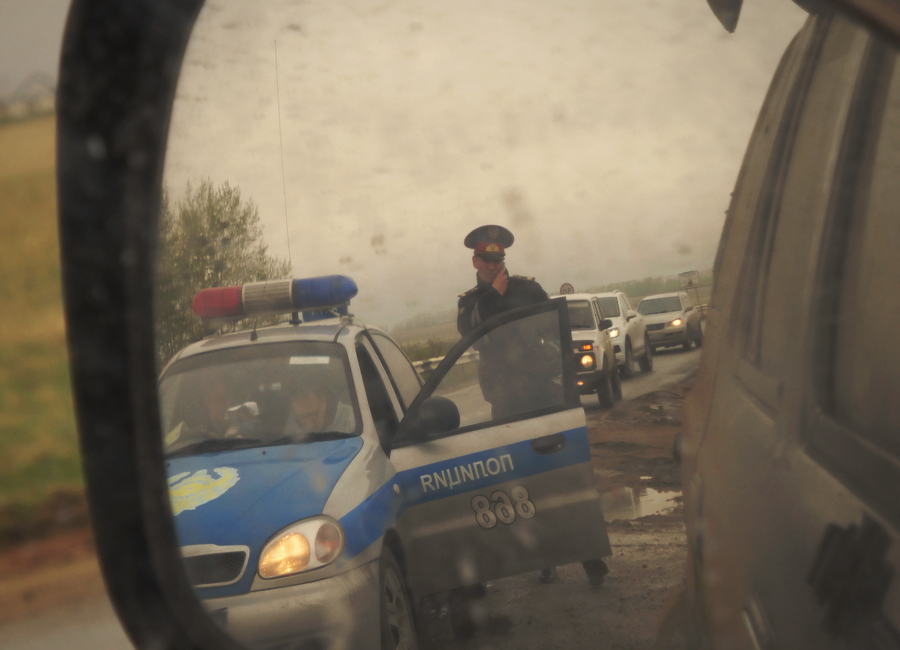
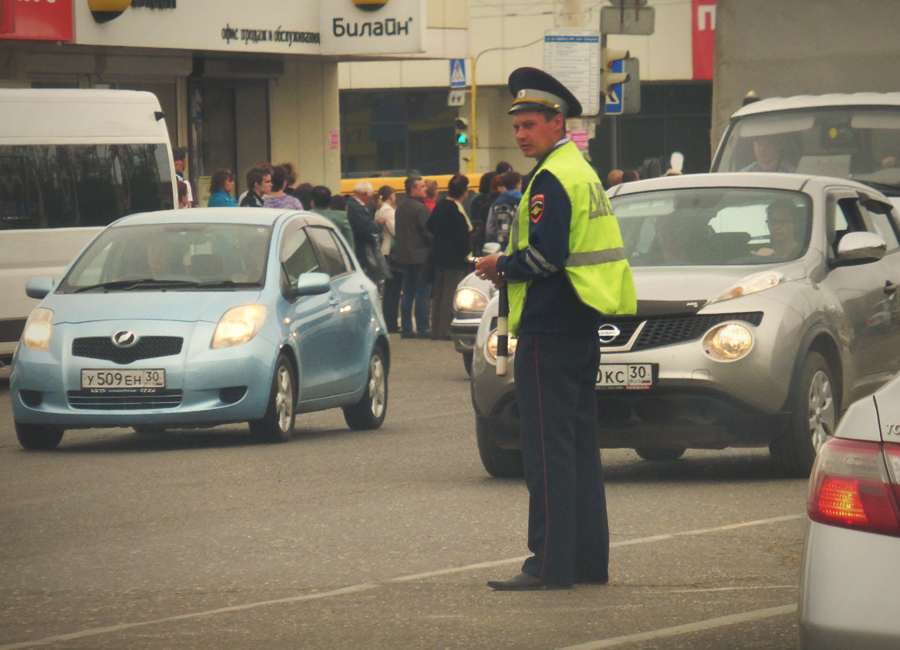
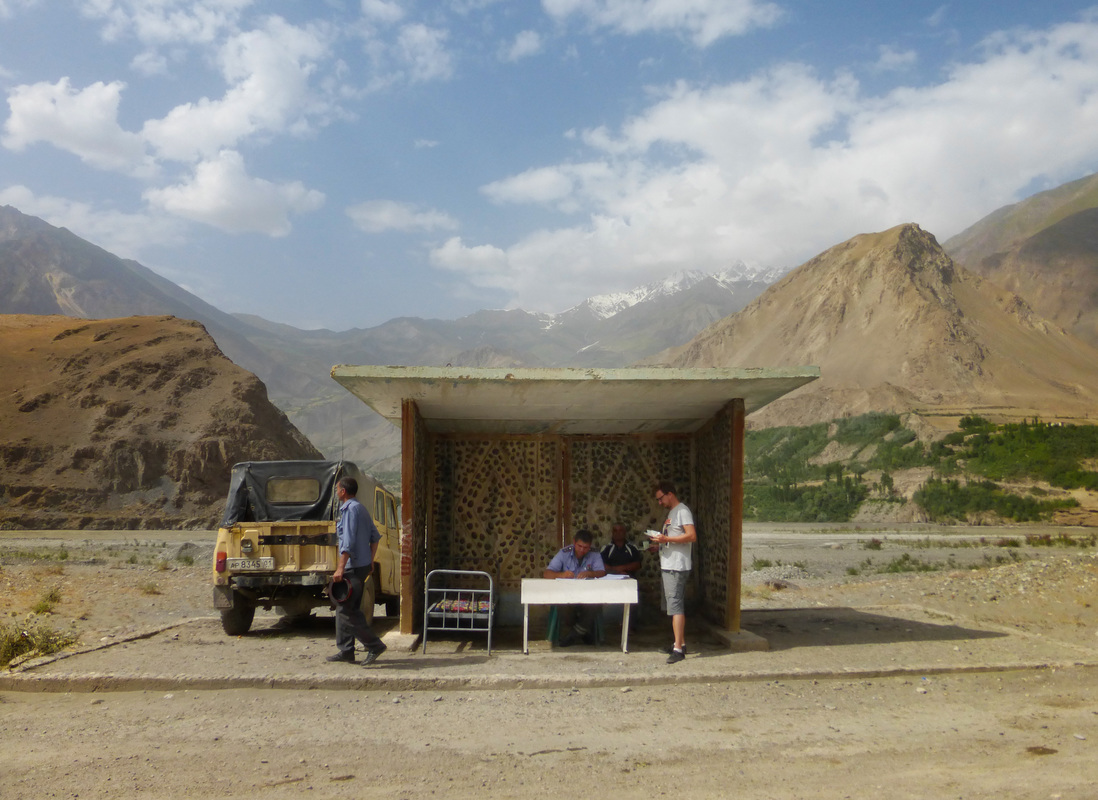
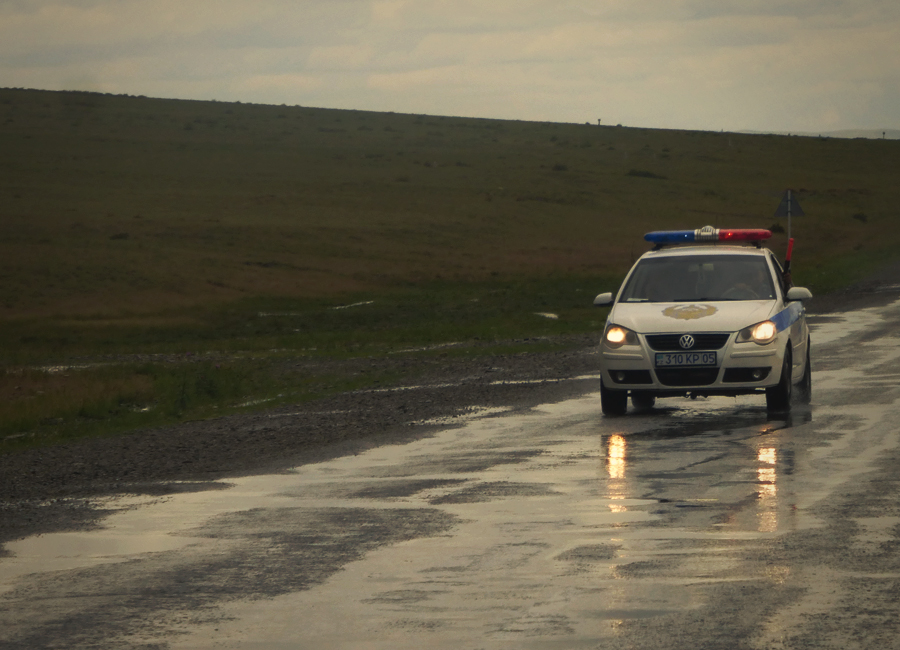
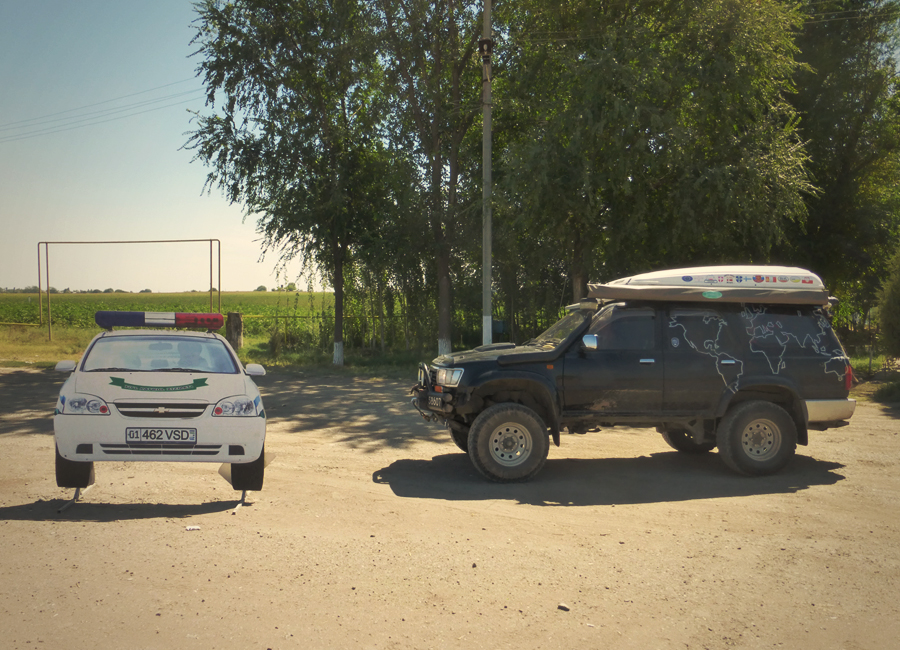
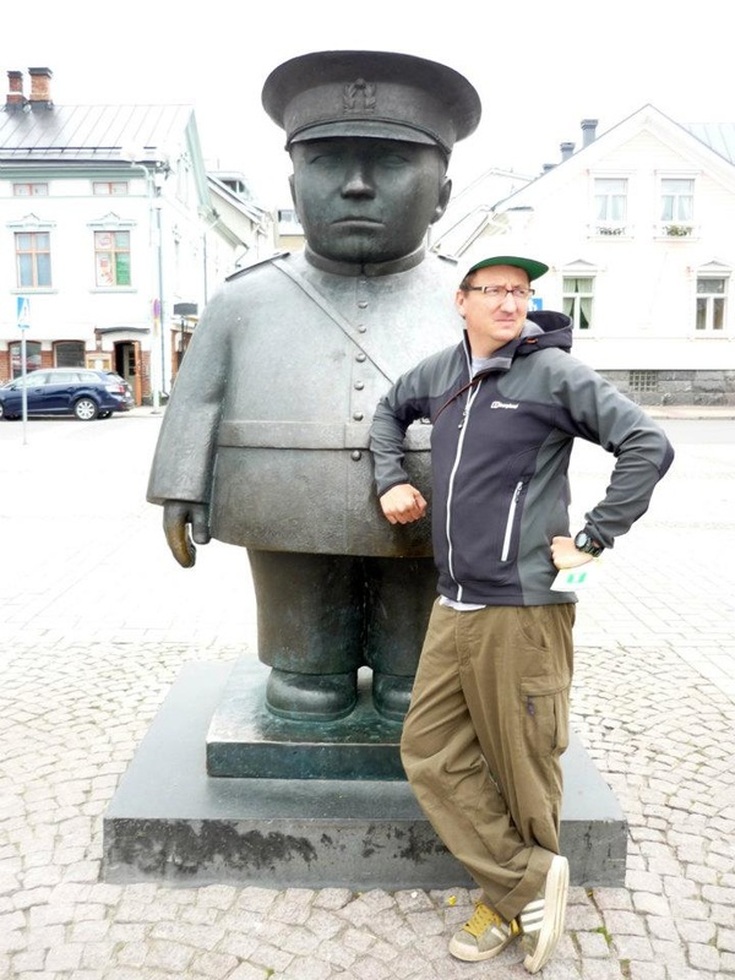
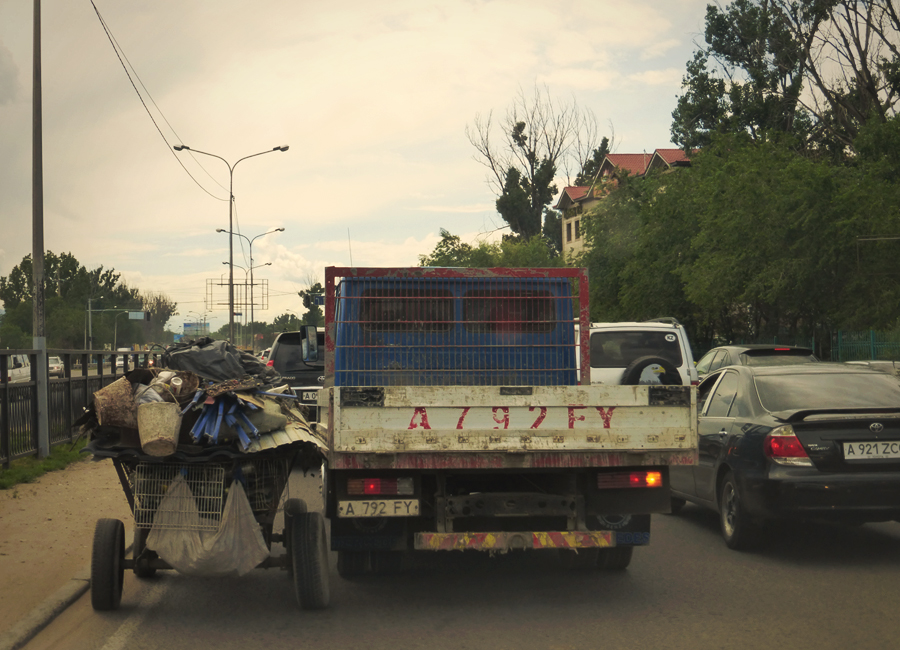
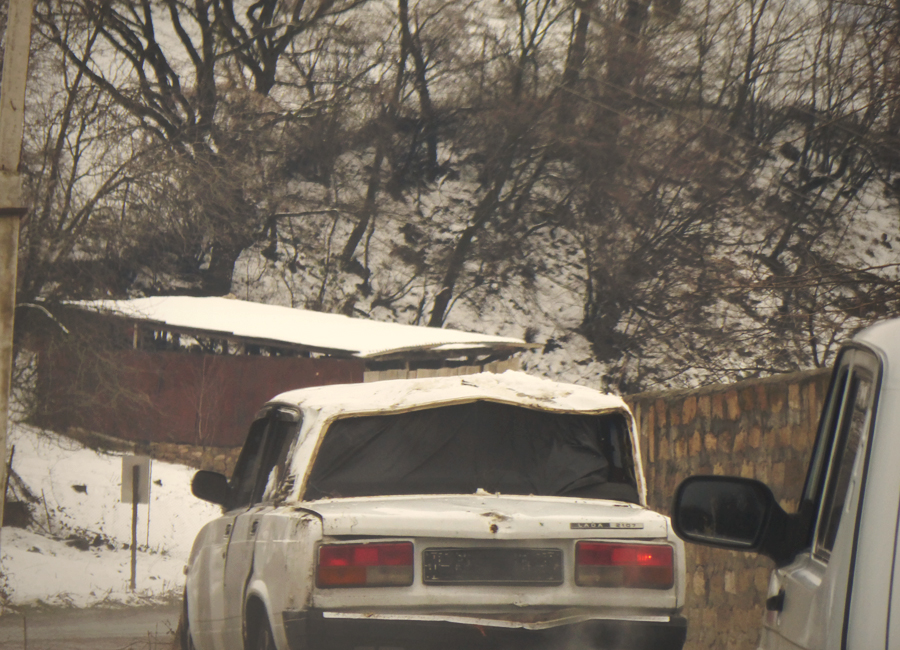
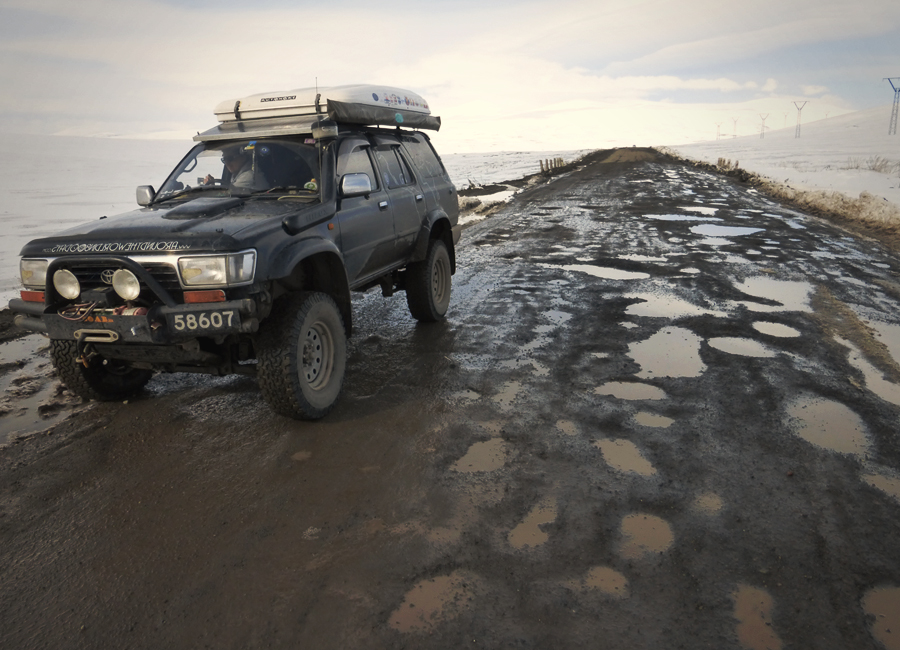
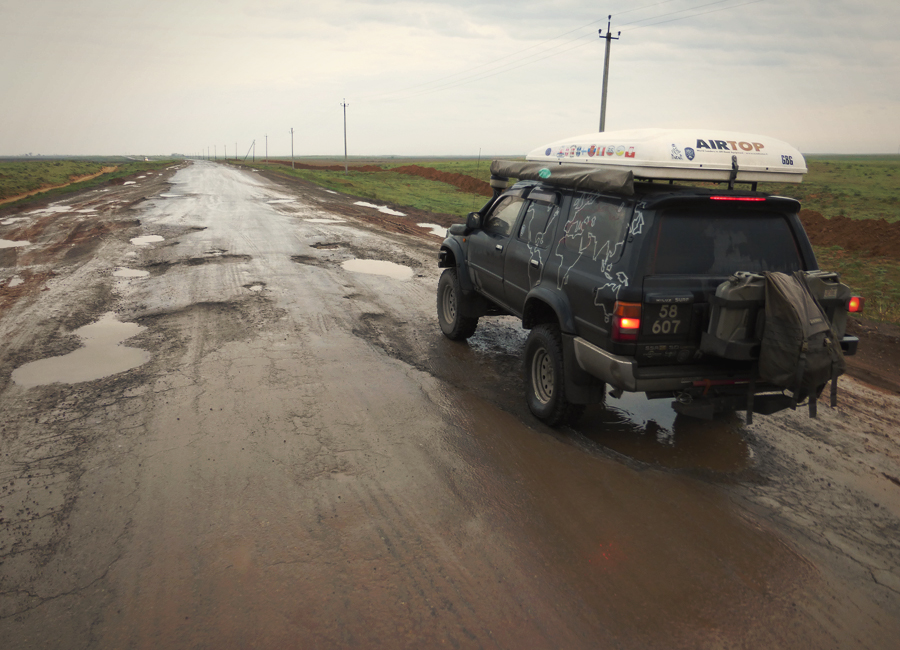
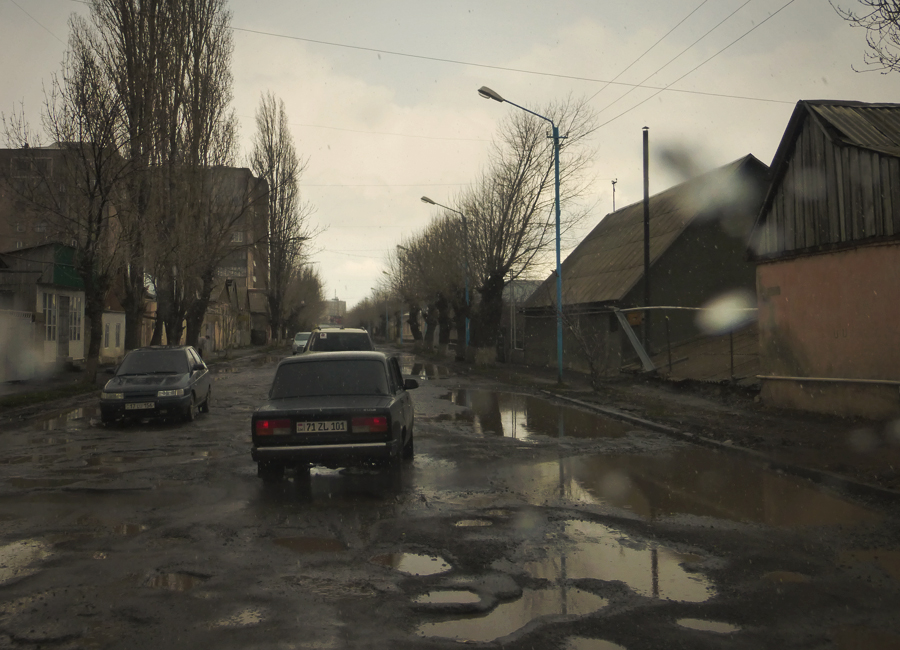
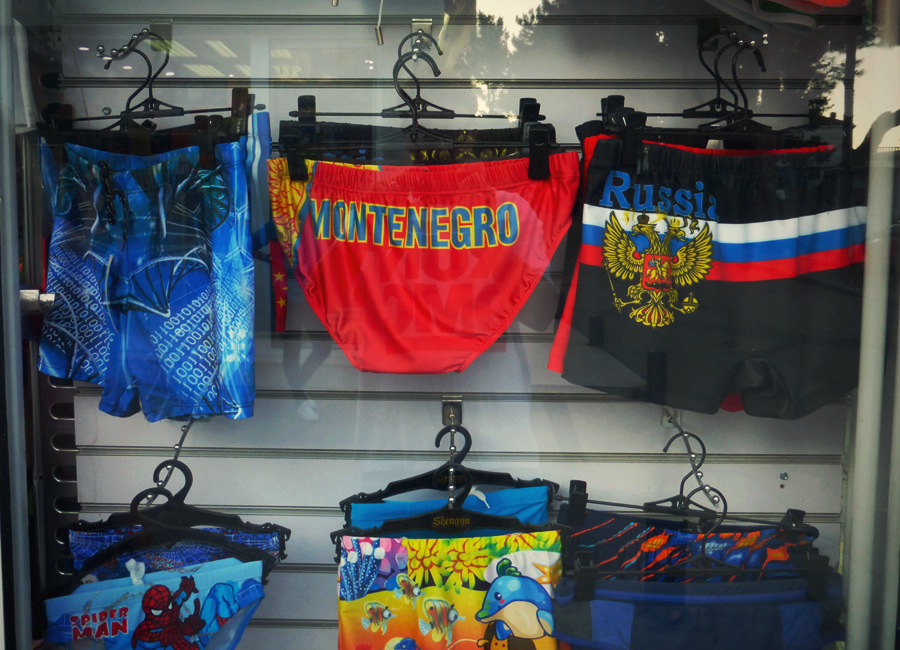


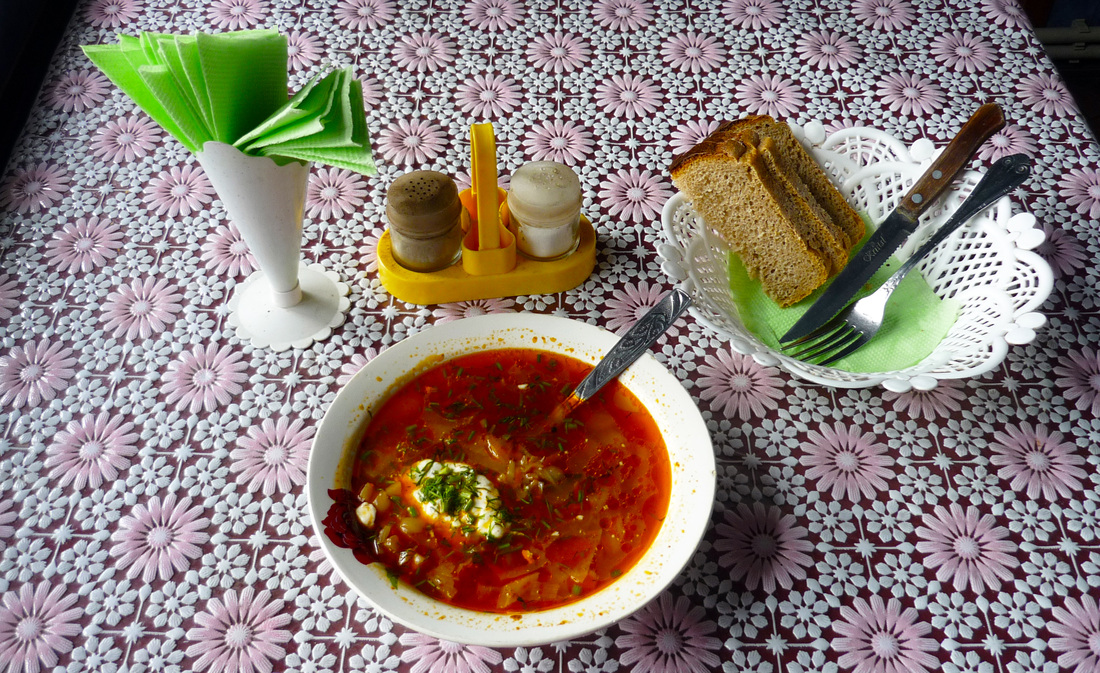


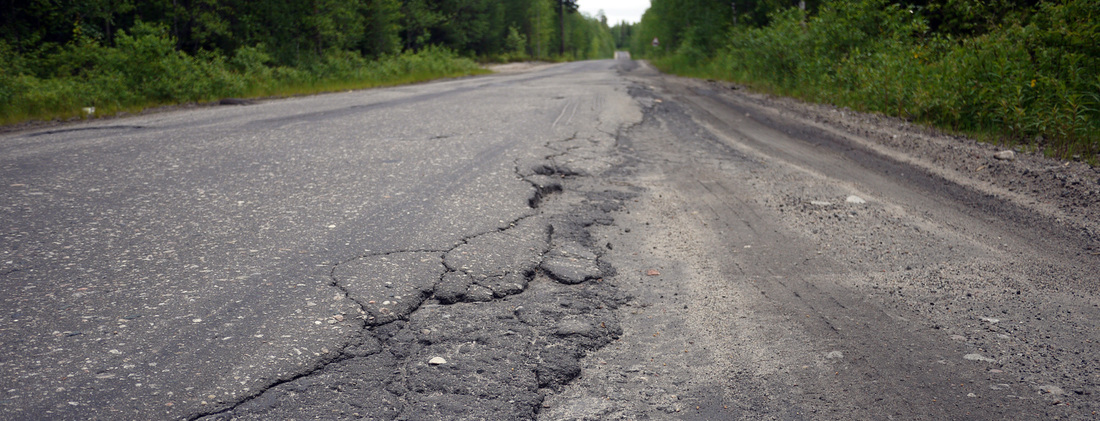
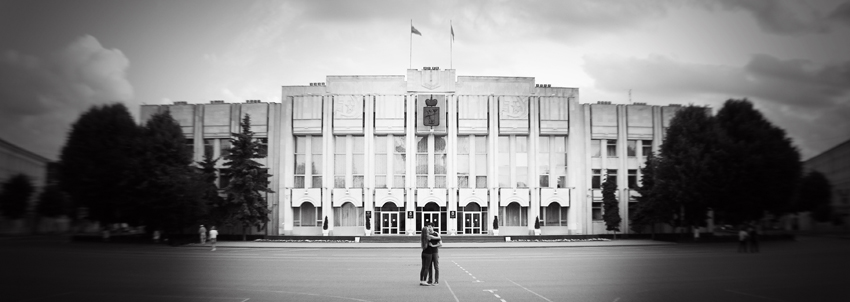
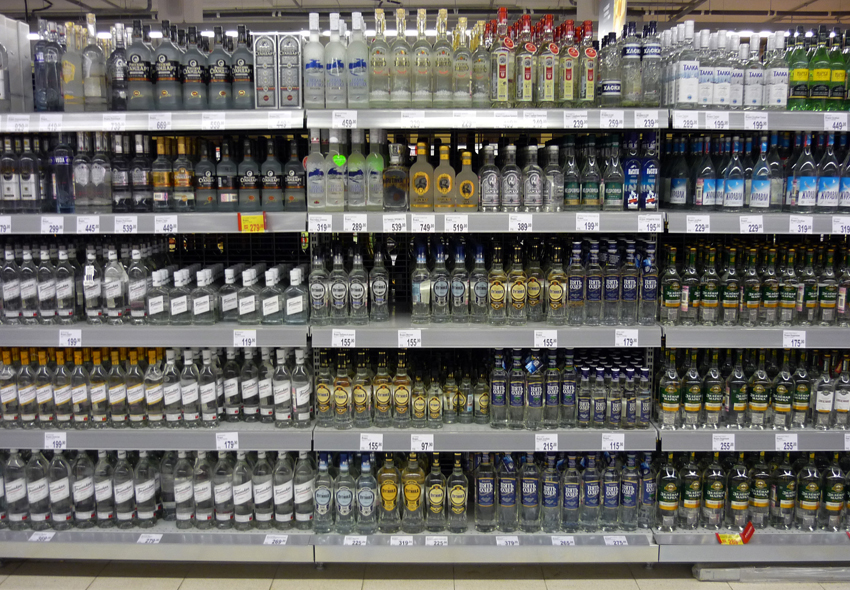




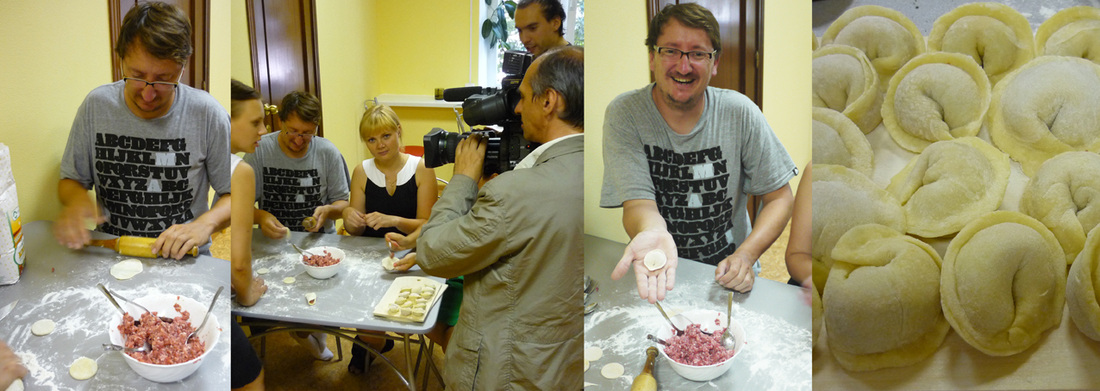
 RSS Feed
RSS Feed